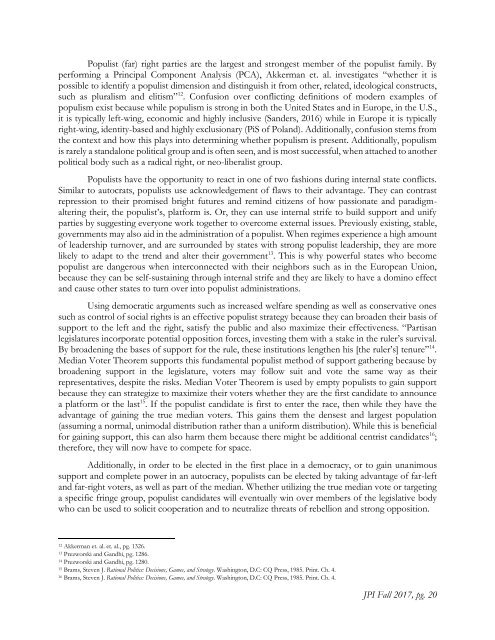JPI Spring 2018
You also want an ePaper? Increase the reach of your titles
YUMPU automatically turns print PDFs into web optimized ePapers that Google loves.
Populist (far) right parties are the largest and strongest member of the populist family. By<br />
performing a Principal Component Analysis (PCA), Akkerman et. al. investigates “whether it is<br />
possible to identify a populist dimension and distinguish it from other, related, ideological constructs,<br />
such as pluralism and elitism” 12 . Confusion over conflicting definitions of modern examples of<br />
populism exist because while populism is strong in both the United States and in Europe, in the U.S.,<br />
it is typically left-wing, economic and highly inclusive (Sanders, 2016) while in Europe it is typically<br />
right-wing, identity-based and highly exclusionary (PiS of Poland). Additionally, confusion stems from<br />
the context and how this plays into determining whether populism is present. Additionally, populism<br />
is rarely a standalone political group and is often seen, and is most successful, when attached to another<br />
political body such as a radical right, or neo-liberalist group.<br />
Populists have the opportunity to react in one of two fashions during internal state conflicts.<br />
Similar to autocrats, populists use acknowledgement of flaws to their advantage. They can contrast<br />
repression to their promised bright futures and remind citizens of how passionate and paradigmaltering<br />
their, the populist’s, platform is. Or, they can use internal strife to build support and unify<br />
parties by suggesting everyone work together to overcome external issues. Previously existing, stable,<br />
governments may also aid in the administration of a populist. When regimes experience a high amount<br />
of leadership turnover, and are surrounded by states with strong populist leadership, they are more<br />
likely to adapt to the trend and alter their government 13 . This is why powerful states who become<br />
populist are dangerous when interconnected with their neighbors such as in the European Union,<br />
because they can be self-sustaining through internal strife and they are likely to have a domino effect<br />
and cause other states to turn over into populist administrations.<br />
Using democratic arguments such as increased welfare spending as well as conservative ones<br />
such as control of social rights is an effective populist strategy because they can broaden their basis of<br />
support to the left and the right, satisfy the public and also maximize their effectiveness. “Partisan<br />
legislatures incorporate potential opposition forces, investing them with a stake in the ruler’s survival.<br />
By broadening the bases of support for the rule, these institutions lengthen his [the ruler’s] tenure” 14 .<br />
Median Voter Theorem supports this fundamental populist method of support gathering because by<br />
broadening support in the legislature, voters may follow suit and vote the same way as their<br />
representatives, despite the risks. Median Voter Theorem is used by empty populists to gain support<br />
because they can strategize to maximize their voters whether they are the first candidate to announce<br />
a platform or the last 15 . If the populist candidate is first to enter the race, then while they have the<br />
advantage of gaining the true median voters. This gains them the densest and largest population<br />
(assuming a normal, unimodal distribution rather than a uniform distribution). While this is beneficial<br />
for gaining support, this can also harm them because there might be additional centrist candidates 16 ;<br />
therefore, they will now have to compete for space.<br />
Additionally, in order to be elected in the first place in a democracy, or to gain unanimous<br />
support and complete power in an autocracy, populists can be elected by taking advantage of far-left<br />
and far-right voters, as well as part of the median. Whether utilizing the true median vote or targeting<br />
a specific fringe group, populist candidates will eventually win over members of the legislative body<br />
who can be used to solicit cooperation and to neutralize threats of rebellion and strong opposition.<br />
12<br />
Akkerman et. al. et. al., pg. 1326.<br />
13<br />
Prezworski and Gandhi, pg. 1286.<br />
14<br />
Prezworski and Gandhi, pg. 1280.<br />
15<br />
Brams, Steven J. Rational Politics: Decisions, Games, and Strategy. Washington, D.C: CQ Press, 1985. Print. Ch. 4.<br />
16<br />
Brams, Steven J. Rational Politics: Decisions, Games, and Strategy. Washington, D.C: CQ Press, 1985. Print. Ch. 4.<br />
<strong>JPI</strong> Fall 2017, pg. 20
















